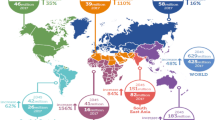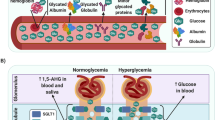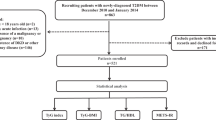Abstract
Impaired lipid metabolism resulting from uncontrolled hyperglycaemia has been implicated in cardiovascular complications in diabetes patients. The aim of this study was to examine the impact of glycaemic control on the lipid profile of diabetic patients. We also determined the ability of glycated haemoglobin (HbA1c) as an indirect marker of dyslipidaemia. A total of 1011 type 2 diabetic patients (males, 574; females, 437; mean age, 59.76 years) were included in this study. Venous blood samples were collected from all the subjects after at least 8 h fasting. The sera were analysed for HbA1c, fasting blood glucose (FBG), total cholesterol, triglycerides (TG), high-density lipoprotein cholesterol (HDL) and low-density lipoprotein cholesterol (LDL). The levels of HbA1c, FBG and LDL did not differ significantly between males and females. Female patients showed significantly higher serum cholesterol and HDL but significantly lower TG levels as compared to males. There was a highly significant correlation between HbA1c and FBG. Both HbA1c and FBG exhibited direct correlations with cholesterol, TG and LDL and inverse correlation with HDL; the magnitude of significance for all these lipid parameters being greater with HbA1c than FBG. There was a linear relationship between HbA1c and dyslipidaemia. The levels of serum cholesterol and TG were significantly higher and of HDL significantly lower in patients with worse glycaemic control as compared to patients with good glycaemic control. The findings of this study clearly indicate that HbA1c is not only a useful biomarker of long-term glycaemic control but also a good predictor of lipid profile. Thus, monitoring of glycaemic control using HbA1c could have additional benefits of identifying diabetic patients who are at a greater risk of cardiovascular complications.
Similar content being viewed by others
Author information
Authors and Affiliations
Corresponding author
Rights and permissions
About this article
Cite this article
Khan, H.A., Sobki, S.H. & Khan, S.A. Association between glycaemic control and serum lipids profile in type 2 diabetic patients: HbA1c predicts dyslipidaemia. Clin. Exper.Med. 7, 24–29 (2007). https://doi.org/10.1007/s10238-007-0121-3
Received:
Accepted:
Issue Date:
DOI: https://doi.org/10.1007/s10238-007-0121-3




